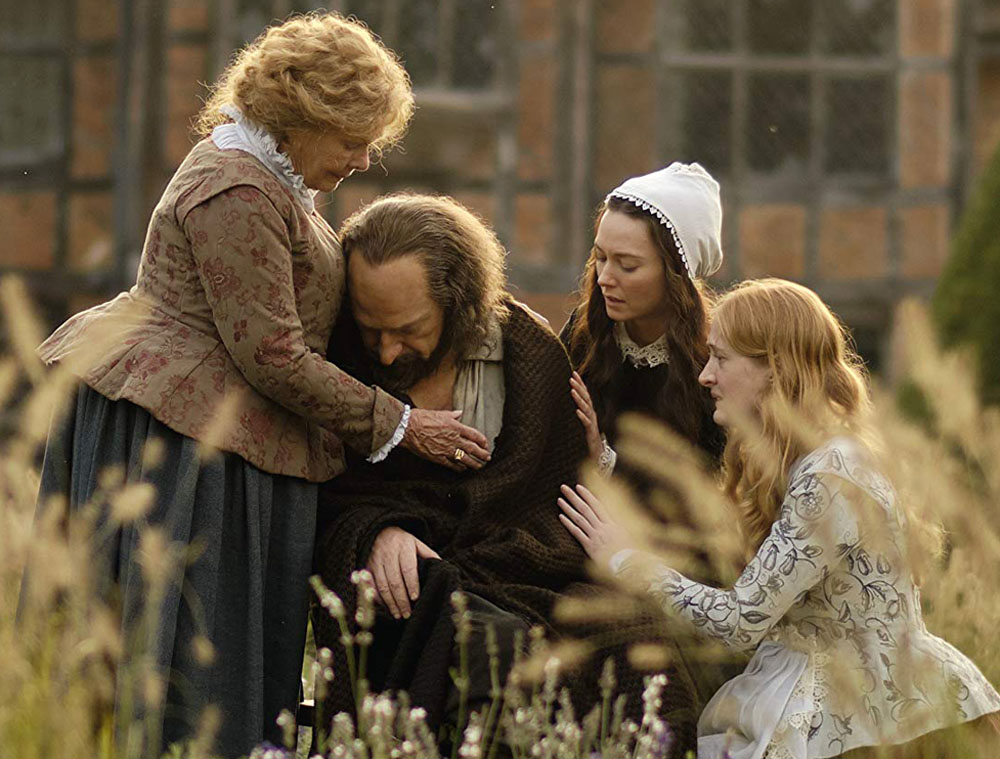

Yes, lots of people will be rushing to John Wick 3 this weekend. Some, however, will be glad of alternate programming release All is True. After all, it features Kenneth Branagh, Judi Dench, and Ian McKellen, and is directed by Branagh. That’s as much thespian power as John Wick has firepower! The film, though deeply rooted in the costume drama aesthetic and with the pacing to match, has enough plot twists to give a BBC period piece-loving viewer whiplash. It is written by award-winning novelist, playwright, and screenwriter Ben Elton (The Young Ones, Popcorn, The Beautiful Game) who fills the holes in a lesser-known part of Shakespeare’s life story, his last three years alive. The extrapolations from what historians do and don’t know are fascinating, and all to the good.
All is True takes place in 1613, during the last years of the famed playwright and poet. Shakespeare (Branagh) returns to Stratford-upon-Avon after the Globe Theater burns down. He is determined never to write again and stay with his wife and family, whom he has barely seen in his many years in London. Among other things, he was not present for the death of his 11-year-old son Hamnet. Thus begins Will’s very delayed grieving for Hamnet, which leads to him working to create a memorial garden. His wife Anne (Judi Dench) and daughters Judith (Kathryn Wilder), and Susannah (Lydia Wilson) are not pleased to see him, mostly because they are each struggling with varying degrees of unhappiness and lack of fulfillment. They don’t appreciate having to dredge up the pain of Hamnet’s loss, and appreciate even less their father’s or husband’s judgements, and his expectations for them as women of the 1600s.
To add to the kerfuffle Shakespeare is making by his presence, his patron the Earl of Southampton (Ian McKellen) is coming for a visit, and Anne suspects Will’s sonnets, a public display of affection to someone else, were written about Southampton. The relationship between Will and his family is examined, as are his feelings about himself, his identity, and his integrity as father and husband. In other words, albeit in a slow, verbose way, ‘big fam drama goes down’.
For this film to work, there’s an intense character arc requiring finesse and subtlety, and Branagh is certainly one actor up to the challenge. Nothing short of total immersion in the role must have been required, and it’s clear he was all in. His scenes with Judy Dench are understated but often gut-wrenching, as are those with them and Kathryn Wilder and Lydia Wilson as daughters Judith and Susannah. Elton offers a screenplay that bluntly shows the shocking lack of agency and autonomy for women of the era. His wife can’t read or write and Susannah is trapped in an abusive marriage. Judith strains at nearly all of society’s expectations for her, from marriage, to motherhood, to being silent and lesser than any man. Not only does Judith, Hamnet’s twin, live with survivor guilt, she has to hear from her father how much more special, talented, and important her brother was and always will be. All is True also feels incredibly timely in its portrayal of loss fracturing a family, and how when a family doesn’t move forward, grief can go stagnant, and poison everyone’s heart and spirit from the inside.
Most impressive of all is one scene between Branagh and McKellen, wherein they both recite a sonnet, but each with an entirely different meaning. Not only is it a display of the colossal talent of both actors, it’s also heartbreaking. The nuance of Elton’s screenplay as performed, where the Earl shows even more classism than his raging internalized homophobia, is quite a thing to behold. McKellen is king.
Nobody is getting what they want in this movie, not even Shakespeare, and he’s a genius. Still, Branagh brings sensitivity and vulnerability to his portrayal, and proves in All is True that his lifelong obsession with Shakespeare’s life has brought worthy fruit. Though at its heart, the filmis a drama about a fractured family, it entertains, not least because watching these talented actors work with each other is such a joy.
4 out of 5 stars


